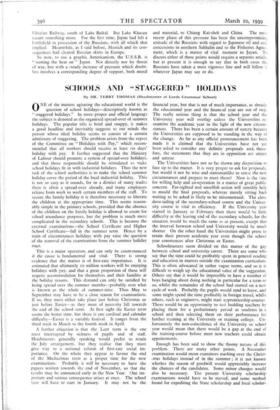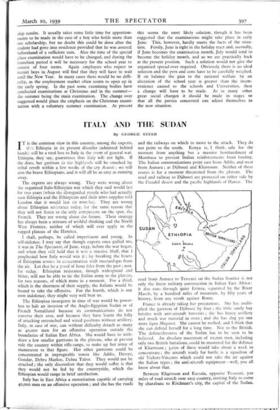SCHOOLS AND " STAGGERED " HOLIDAYS
By DR. TERRY THOMAS (Headmaster of Leeds Grammar School)
ONE of the matters agitating the educational world is the question of school holidays—descriptively known as "staggered holidays." In more proper and official language the subject is denoted as the organised spread-over of summer holidays. The popular title is brief and snappy, it makes a good headline and inevitably suggests to our minds the person whose ideal holiday seems to consist of a certain admixture of staggering. The problem arises from the report of the Committee on "Holidays with Pay," which recom- mended that all workers should receive at least six days' holiday with pay. It further suggested that the Ministry of Labour should promote a system of spread-over holidays, and that those responsible should be stimulated to make school holidays fit in with industrial holidays. Thus the new task of the school authorities is to make the school summer holiday cover the period of the local industrial holiday. This is not so easy as it sounds, for in a district of many trades there is often a spread-over already, and many employers release from week to week certain members of the staff. To secure the family holiday it is therefore necessary to liberate the children at the appropriate time. This seems reason- ably simple in the primary schools, provided that the absence of the children on the family holiday is allowed to count for school attendance purposes, but the problem is much more complicated in the secondary schools. This is because the external examinations—the School Certificate and Higher School Certificate—fall in the summer term. Hence by a train of circumstances holidays with pay raise the question of the removal of the examinations from the summer holiday tract.
This is a major operation, and can only be countenanced if the cause is fundamental and vital. There is strong evidence that the matter is of first-rate importance. It is estimated that ultimately io million workers will be enjoying holidays with pay, and that a great proportion of these will require accommodation for themselves and their families at the holiday resorts. This demand can only be satisfied by being spread over the summer months—probably over what is known as the whole of summer-time. Thus May to September may have to be a close season for examinations. If so, they must either take place just before Christmas or just before Easter—as they must of necessity fall towards the end of the school term. At first sight the Easter term seems the better time, but there is one cardinal and calendar difficulty—Easter is a variable festival. It ranges from the third week in March to the fourth week in April.
A further objection is that the Lent term is the one most interrupted by sickness of pupils and of staff. Headmasters generally speaking would prefer to retain the July arrangement, but they realise that they must give way to a national reform of first-rate social im- portance. On the whole they appear to favour the end of the Michaelmas term as a proper time for the new examinations. Probably it will be necessary to have the papers written towards the end of November, so that the results may be announced early in the New Year. One im- portant and serious consequence arises at once. The school year will have to start in January. It may not be the financial year, but that is not of much importance, as already the educational year and the financial year are out of step. The really serious thing is that the school year and the University year will overlap unless the Universities re- examine the academic year in the light of the new circum- stances. There has been a certain amount of outcry because the Universities are supposed to be standing in the way of the change. As far as any official pronouncement has been made it is claimed that the Universities have not yet been asked to consider any definite proposals and, there- fore, the statements that they are in opposition are unjust and untrue.
The Universities have not so far shown any disposition to face up to the matter. It is very proper to ask for proposals, but would it not be wise and statesmanlike to sense the new circumstances and prepare to meet them? Now is the time for willing help and co-operation in a matter of great public concern. Far-sighted and unselfish action will sensibly help to mould the final proposals, whereas merely sitting back waiting to be asked is likely to be misconstrued. The close dove-tailing of the secondary-school course and the Univer- sity course is vital to efficiency. If the University year started in January or February then there would be little difficulty at the leaving end of the secondary schools, for the situation would be much the same as at present, except that the interval between school and University would be much shorter. On the other hand the Universities might press to retain their present academic year even though the school year commences after Christmas or Easter.
Schoolmasters seem divided on this matter of the gap between school and university career. There are some who say that the time could be profitably spent in general reading and education in matters outside the examination curriculum. This is often advocated in rather vague terms, and so it is difficult to weigh up. the educational value of the suggestion. Others say that it would be impossible to have a number of boys hanging about doing nothing in particular for a term or so, whilst the remainder of the school had started on a new cycle of work. Probably the pupils would tend to leave, and some might spend the time profitably in foreign travel, whilst others, such as engineers, might start apprenticeship-courses There would be an opportunity to test budding teachers by placing them for a probationary period as students in a school and then selecting them on their performance for further training at the University or training college. Un- fortunately the non-coincidence of the University or school year would mean that there would be a gap at the end of the training-course before most new teachers could obtain appointments.
Enough has been said to show the thorny nature of this problem. There are many other points. A November examination would mean examiners marking over the Christ- atlas holidays instead of in the summer ; it is not known whether the season of goodwill would appreciably increase the chances of the candidates. Some minor changes would also be necessary. The present University scholarship examinations would have to be moved, and some method found for expediting the State scholarship and local scholar- ship results. It usually takes some little time for apportion- ments to be made in the case of a boy who holds more than one scholarship, but no doubt this could be done after the student had gone into residence provided that he was assured beforehand of a sufficient sum. Also the time of the special place examination would have to be changed, and during the transition period it will be necessary for the school year to consist of four terms. Again employers who expect to recruit boys in August will find that they will have to wait until the New Year. In many cases there would be no diffi- culty, as the employment market often seems to open up in the early spring. In the past some examining bodies have conducted examinations at Christmas and in the summer— the summer being the main examination. The change over suggested would place the emphasis on the Christmas exami- nation with a voluntary summer examination. At present this seems the most likely solution, though it has been suggested that the examinations might take place in early June. This, however, hardly meets the facts of the situa- tion. Firstly, June is right in the holiday tract and, secondly, if June becomes the examination month, July would tend to become the holiday month, and so we are practically back at the present position. Such a solution would not give the organised spread-over required. Obviously there is no ideal solution and the pros and cons have to be carefully weighed. If on balance the gain to the national welfare by an alteration of the school year is greater than the incon- venience caused to the schools and Universities, then a change will have to be made. As in many other great social changes it should be made in stages so that all the parties concerned can adjust themselves to the new situation.











































 Previous page
Previous page